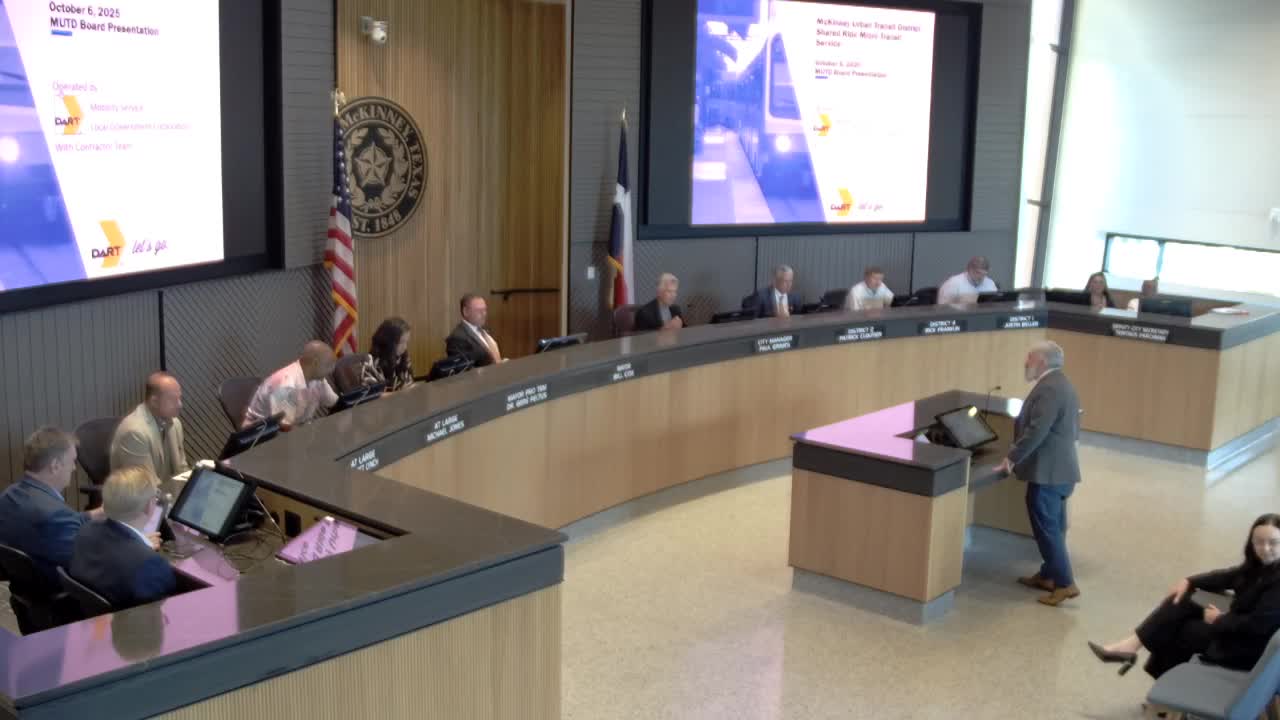McKinney transit officials report steady ridership, average wait under 10 minutes
October 06, 2025 | McKinney, Collin County, Texas
This article was created by AI summarizing key points discussed. AI makes mistakes, so for full details and context, please refer to the video of the full meeting. Please report any errors so we can fix them. Report an error »

Ryan McCutcheon, a project manager with Dallas Area Rapid Transit’s service planning and scheduling department, told the McKinney Urban Transit District board Monday that ridership for the Collin County on-demand service has grown over the last four years and has plateaued in 2025.
“On average, we provide transportation to 270 riders per weekday,” McCutcheon said. He said seasonal dips occur in summer months when fewer people travel for school.
McCutcheon said the system’s average wait time this calendar year has been about 10 minutes or less and that vehicles typically reach customers in under 15 minutes, a metric the presenter described as a key customer-experience indicator. He said average single-trip travel distance this year is about 7.5 miles and that ride duration is generally 17 to 18 minutes.
The presenter described recent fare and service changes. He noted the board approved a switch earlier in 2025 from a flat fare to a distance-based fare and said ridership has not shown a substantial decline after that change. McCutcheon said fare-box revenue is correlated with ridership levels and that the transition to a distance-based fare was intended to make the service more sustainable.
McCutcheon gave subsidy figures that illustrate operational cost differences between vehicle types and vendor partnerships. He said dedicated wheelchair-accessible vehicles average about $29 of subsidy per rider, while trips provided through the district’s Lyft partnership average about $11.26 per rider, and described the rideshare partnership as a tool to expand vehicle capacity and limit costs.
He also highlighted geographic trip patterns in McKinney and Collin County, citing medical trips to Baylor Scott & White, shopping corridors around University and Central, and a partnership to provide trips to Samaritan Inn, which he described as the largest unhoused-services campus in Collin County. He said the service also connects riders to destinations in neighboring Plano.
McCutcheon closed by saying the program continues to enroll new riders (219 approvals this year, he said) while growth appears to be tapering, and he invited questions from the board.
“On average, we provide transportation to 270 riders per weekday,” McCutcheon said. He said seasonal dips occur in summer months when fewer people travel for school.
McCutcheon said the system’s average wait time this calendar year has been about 10 minutes or less and that vehicles typically reach customers in under 15 minutes, a metric the presenter described as a key customer-experience indicator. He said average single-trip travel distance this year is about 7.5 miles and that ride duration is generally 17 to 18 minutes.
The presenter described recent fare and service changes. He noted the board approved a switch earlier in 2025 from a flat fare to a distance-based fare and said ridership has not shown a substantial decline after that change. McCutcheon said fare-box revenue is correlated with ridership levels and that the transition to a distance-based fare was intended to make the service more sustainable.
McCutcheon gave subsidy figures that illustrate operational cost differences between vehicle types and vendor partnerships. He said dedicated wheelchair-accessible vehicles average about $29 of subsidy per rider, while trips provided through the district’s Lyft partnership average about $11.26 per rider, and described the rideshare partnership as a tool to expand vehicle capacity and limit costs.
He also highlighted geographic trip patterns in McKinney and Collin County, citing medical trips to Baylor Scott & White, shopping corridors around University and Central, and a partnership to provide trips to Samaritan Inn, which he described as the largest unhoused-services campus in Collin County. He said the service also connects riders to destinations in neighboring Plano.
McCutcheon closed by saying the program continues to enroll new riders (219 approvals this year, he said) while growth appears to be tapering, and he invited questions from the board.
View full meeting
This article is based on a recent meeting—watch the full video and explore the complete transcript for deeper insights into the discussion.
View full meeting
